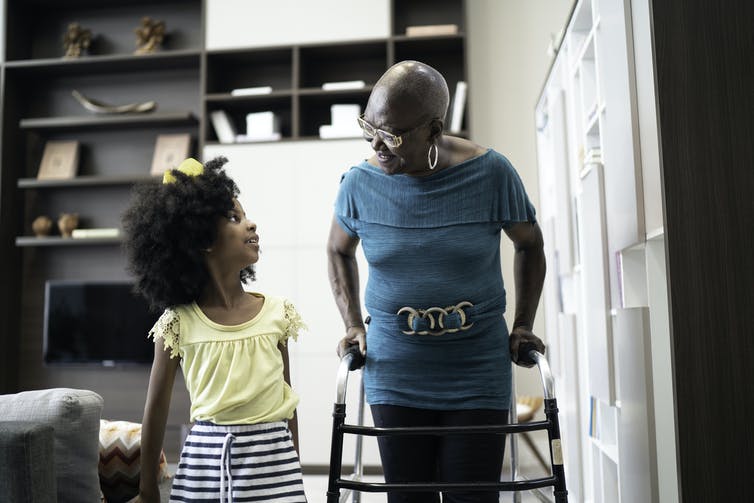
With the second holiday season of the pandemic upon us, many people will have the opportunity to rejoin family and friends for celebrations. The pandemic has kept many of us apart longer than expected, and it may have been months since we’ve visited with our loved ones. In addition to enjoying food, folks and fun, there may be some not-so-pleasant surprises.
As a geriatrician, I often see patients whose families voice concerns about their health or well-being. This can be especially heightened if they haven’t seen each other in a while. The holidays can be an opportunity to not just enjoy the fruitcake but observe how your aging parents, grandparents or great-grandparents are doing at home. Objectively observing their functioning and memory can uncover warning signs that more evaluation is needed.
This can lead to uncomfortable situations and often feels like role reversal. Maintaining older adults’ autonomy and dignity needs to be the core of all of these conversations. If you are concerned about someone’s health, approach the conversation with an open mind and genuine curiosity to listen to their thoughts. Don’t assume you understand their situation. Make observations, not assumptions.
To take a step back for a moment, I would emphasize to not form conclusions about anyone’s ability to care for themselves based on age. Many people do quite well taking care of themselves and remaining independent well into their 90s or more, while other people may need more assistance with self-care earlier in life.
Everyday functioning
Take a look around the house. Have loved ones been able to keep up with basic care of the home or yard? If not, these can be signs that someone may need more help at home. Sometimes that could mean simply hiring someone to clean the pool or shovel the snow. Other times, it may be a sign of limited physical function: Maybe they can’t move around as well or bend over to pick things up.
But if basic cleaning isn’t happening, that could also be a sign of limitations in cognitive function – perhaps they forget to remove the trash from the kitchen for weeks or don’t remember to go to the store for basic needs. Other times, it’s just a sign that they were too busy to mow the yard before your visit. Again, don’t make assumptions, make observations – and always see them in the larger context.
Watch how your loved one is moving around the house. If they have been told to use a cane or walker before, are they? Is their balance bad? Are they getting by with “furniture surfing,” holding on to furniture or walls while walking?

FG Trade/E+ via Getty Images
What about driving? If you have concerns, remember there are many factors that may be playing a role. It’s about skills, not age. Arthritis in the neck might make it hard to look at crossing traffic. Vision problems can cause blurring, especially at night. Limitations in cognition can also cause trouble, such as getting lost while driving somewhere familiar – like the grocery store or a friend’s house.
[3 media outlets, 1 religion newsletter. Get stories from The Conversation, AP and RNS.]
If you notice signs of unsafe driving, it’s important to get loved ones evaluated for their own safety, as well as that of others on the road. Have an open and honest conversation with their health care clinician to review these concerns. There are also community resources to help navigate these difficult conversations, such as the site alz.org for concerns about dementia and driving.
If you notice changes in your relative, remember too that the pandemic has put extra stress and anxiety on many people. Over the past two years, some of us have not just been social distancing but also experiencing social isolation. Feeling cut off from our community can lead to serious health problems. The National Institute on Aging has great resources to understand the difference between being lonely and being socially isolated, and how to identify and act on these concerns.
See something, say something – with care
The holidays can bring chaotic schedules. Many people can be overwhelmed by their commitments, or forget important plans, and it’s not necessarily a sign of dementia. Anybody can forget to bring home cranberry sauce or which exact yogurt the grandkids like.
When it may be a sign of something more significant is if memory loss affects daily life – especially things like eating, dressing and hygiene. If you notice that there may be more than typical forgetfulness, then it is time to talk.
You can ask open nonjudgmental questions to start the conversation. Avoid making assumptions – something like “Why didn’t you tell us that you’re not safe at home?” won’t start a useful conversation. Instead, start by describing your observations: “I saw that you just stumbled in the hallway. Is that something you have noticed before?” Allow space for reflection and insight. Don’t tell other people how they “should” be feeling, but listen for their own thoughts and observations.
See if your loved one would allow you to join them at an upcoming clinic visit to discuss whether there is an issue and, if so, how to make things better. If so, be there primarily as an observer or to add in details when asked. If you are not able to attend, you can consider writing a letter to describe your observations, which the patient could share with their team at the next visit.
Getting together at the holidays is intended to be a reunion of family and community to enjoy the season. Nobody wants to focus on problems, but be observant. If you see warning signs that things may not be going well, say something – thoughtfully.
![]()
Laurie Archbald-Pannone does not work for, consult, own shares in or receive funding from any company or organisation that would benefit from this article, and has disclosed no relevant affiliations beyond their academic appointment.























